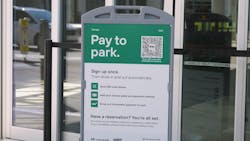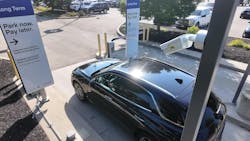Vehicle parking accounts for the top source (24%) of non-aeronautical revenue at airports, ahead of retail concessions, real estate investments, and rental car fees, according to the Airports Council International.
At the same time, aging parking access and revenue control equipment like ticket machines and pay stations fail regularly after years of operation. This results in operational cost increases, potential revenue leakage from downtime, and negative impacts on customer satisfaction due to traffic build up at entry and exit. For busy airport executives, these issues are easy to overlook and not prioritize because parking revenue is predictable and significant. However, those who do prioritize parking can quickly find a meaningful area of value creation in terms of revenue and customer experience improvement.
Artificial intelligence (AI) can help airport executives realize this untapped value by transforming airport parking into a hands-off operation that is always on, never breaks down, is more accurate and financially accountable, and provides a better parking experience for airport customers.
AI-enabled parking management systems can improve conditions for operational and landside managers by eliminating the need to:
● Schedule and pay staff to operate payment booths.
● Schedule and pay maintenance and repair staff for traditional fee-collection ticket machines and kiosks.
● Reroute parking traffic when lanes unexpectedly need to close or back up from slow operation.
For airport executives and managers, AI can provide better predictability and control of parking revenue through more accurate vehicle and fee identification. It can also replace electromechanical fee-collection machines and kiosks, which disrupt automatic collections and require significant labor expense when they break down.
In addition, AI has the power to attract more airport parkers by automating every aspect of airport parking — from reserving a spot to paying — consistently and reliably.
How does an AI-enabled parking system work?
An AI-enabled parking system works by creating a digital fingerprint of each vehicle that includes necessary data about the vehicle. Combined hardware and software identify the vehicle instantly via its digital fingerprint as it approaches a parking facility, prompting actions that enable the driver to enter, exit, and pay without stopping. Vehicle identification, fee calculation, and the payment transaction all happen in the background, without intervention from drivers or airport staff.
Dayton International Airport, San Antonio International Airport, Northwest Arkansas National Airport, and Aspen/Pitkin County Airport all recently adopted the Metropolis for Airports AI-enabled modern parking system.
It’s an upgrade that is paying off at Dayton International Airport (DAY): Growing popularity and consistently reliable collections have lifted in-plane revenue per passenger from $10 to $13.14.
“It makes [parking] seamless for our customers,” Gil Turner, Director of DAY, says of Metropolis. “They just drive up. They don’t have to roll the window down. They pull up, the system recognizes the vehicle, takes the license plate information, and they’re able to go right in and park. And when they leave, there’s no interaction with the booth person. So it’s all great. I know that flying can be a frustrating process, so when you have a system, you come home, you can just leave and don’t have to have any stress or worries. I mean, it just helps the customer.”
The Metropolis system runs in the cloud and uses computer vision, license plate recognition (LPR), camera-based hardware, machine learning, and AI to automate parking events, as well as parking data collection. The system requires no upfront capital investment from airports and integrates with existing gate equipment.
A driver registers once and is ready to go. Here’s how it works:
● When a car enters the lot, the computer vision-enhanced camera captures the license plate. Intelligent software then recognizes the car as a Metropolis user and prompts the entry gate.
● When the car leaves, the system again recognizes the license plate, calculates the fee, charges the driver’s selected payment method, and prompts the exit gate to open.
● The system automatically sends a receipt to the driver via email or text.
● Data on the parking event is stored and made available.
In addition to automation benefits, AI-enabled parking systems provide real-time data that is highly valuable for more informed staffing, lane management, and lot maintenance planning. This data can also help airport managers and directors respond to customer input and demand in real time, such as instituting dynamic pricing.
And as an intelligent system, an AI-enabled parking management solution becomes faster and more accurate with each data input as it continues to learn, which provides a consistently superior and more predictable experience for parking users. Combined with reservations and dynamic pricing, AI can increase parking revenue because when parking is easier and priced competitively, drivers are more likely to choose an airport lot or garage over an alternative, such as an off-airport facility or ride-hailing service.
Elevate airport parking with AI
Metropolis operates a network with over 4,500 parking locations in more than 50 countries and 350 cities, including over 80 airports. More than 18 million people are Metropolis members.
Relates DAY’s Manager of Business Development, “Metropolis was part of a competitive bid process, and one of the things that stood out between them and the others who were in the process was the technology but also how they implemented it and their focus on the positive impacts to the customer. Positive customer service leads to additional revenue, happier passengers, and everything that we're looking for here at Dayton.”
He adds, “On the very first day Metropolis rolled out, I said I'm going to go test this technology. I tested each of the parking lots. Each one of them worked perfectly, and so the fact is that our passengers can now get that same experience without having to roll down their window and wait in line. They just access our parking. Our slogan is easy to and through, and [the Metropolis solution] is really the definition of that slogan.”
When an airport joins the Metropolis network, the company installs its computer vision cameras and maintains them at no cost. Metropolis also helps with systems integration with existing gates. Then, the payment model shifts to a set-up fee and subscription, as is common for cloud-hosted software services. And like other software-based, consumer-facing brands, Metropolis is constantly improving its product with updates that are automatically deployed across the network.
The bottom line is that airport parking facilities that use Metropolis are faster, easier, more convenient, and less congested than those using traditional systems.
Are you ready to elevate your airport’s parking? Talk to Metropolis today.

